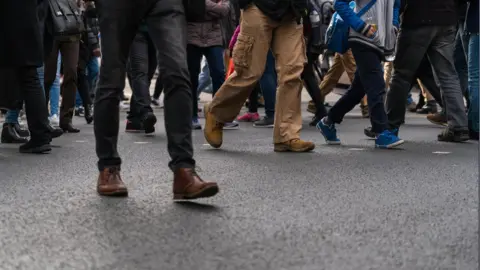Census 2021: One Northern Ireland census question grabs the headlines

 Getty Images
Getty ImagesAbout 60 questions were posed but in truth only one was going to grab the headlines.
It is now official those from a Catholic background outnumber those from a Protestant background for the first time in Northern Ireland's 101-year history.
It is a hugely significant and historic moment but not surprising as the population pattern has been moving in that direction for some time.
In the past 20 years, the population of those from a Protestant background has dropped by more than 10%.
The decline has been linked to an ageing Protestant population with high mortality.
By contrast, the profile of the Catholic population is much younger and in the same 20-year period it has risen by about 3%.
Those pushing for a border poll and a united Ireland will be energised by the census figures.
They will see them as another vital piece in the changing political jigsaw in which unionists no longer hold the majority at Stormont and for the first time Sinn Féin is now the largest party.
The figures may be stacking up for republicans and nationalists but as yet there is no set criteria for when a border poll will be triggered.
Unionists will point to another figure
It remains a judgement call for the Northern Ireland secretary.
But unionists will point to another figure in the census which for them is more telling.
While those from a Catholic background make up almost 46% of the population, only 29% regard themselves as Irish-only.
That trend was also evident in the 2011 census where those from a Catholic background accounted for 45% of the population but only 25% considered themselves Irish.
It is clear religion can't be used as a guide to political preference.
It is also clear that a growing number of those from Catholic and Protestant backgrounds are more comfortable being described as Northern Irish than the traditional tags of British or Irish.
This trend emerged 10 years ago when 21% of the population ticked the Northern Irish box.
That figure has remained steady at 20%.
As a result, the political dynamic has shifted and in a place where political majorities dominated we now have three minority groupings.
Some have linked the trend to the surge in support for the middle ground Alliance Party but other factors also come into play.
The fall out from the 2016 Brexit vote is likely to have shaped political thinking.
It was a game-changing moment which polarised politics in Northern Ireland even more.
Irish passport-holders jump
It may have influenced a switch in political identities away from the traditional British and Irish tags, or towards them.
But more clear is the impact of Brexit on passport holders.
It has clearly led to the massive surge in Irish passport holders which has jumped by 63%.
That may have been driven by those desperate to retain EU citizenship after Brexit or those worried about more practical concerns at airport queues.
Outside the orange and green bubble, the census reveals the growth in multi cultural Northern Ireland with the number of those belonging to ethnic minority groups doubling to 3.4 percent since 2011.
The most prevalent main language other than English was Polish, followed by Lithuanian and then Irish with 6000 speakers.
There has been encouraging signs for Irish language and Ulster Scots campaigners.
The numbers who have some ability in Irish is up to 12% from 10% while there has been a similar 2% increase in Ulster Scots.
Expect much debate today on the census but don't expect much political consensus on what we can read into the figures.
